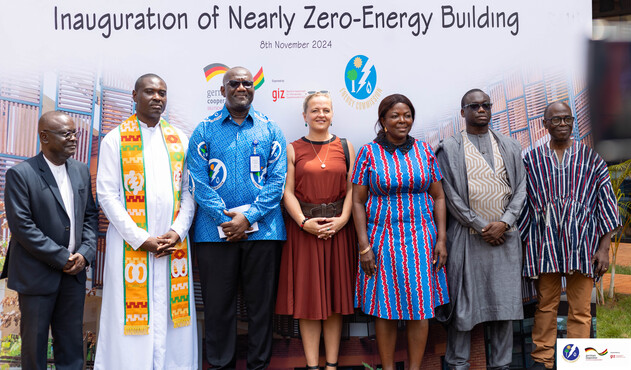West Africa’s First Nearly Zero Energy Building Unveiled in Ghana

In a milestone for sustainable development, Ghana has inaugurated West Africa’s first Nearly Zero Energy Building (NZEB) on the premises of the Energy Commission. This cutting-edge facility sets a new benchmark for energy efficiency and environmental stewardship, signaling Ghana's commitment to transitioning towards net zero emissions.
The NZEB was funded by the German Federal Ministry for Economic Cooperation and Development (BMZ) and implemented by the GIZ Sustainable Energy for Climate Protection (SE4C) project. Constructed over three years, the project leveraged the expertise of German architects and Ghanaian engineering firms.
The result is a state-of-the-art facility designed to showcase sustainability in action. With a gross floor area of 920sqm, the NZEB offers two fully equipped conference rooms with seating capacities of 65 and 70, a meeting room, staff kitchenettes, washrooms, a roof terrace, and a central courtyard.
The building incorporates innovative energy and environmental solutions to reduce its carbon footprint, including a highly efficient and greenhouse gas-free central cooling system. A 50kW peak solar PV system meets 88% of the building’s annual energy demand (56.1MWh), with surplus energy at any time exported via a net metering system to the grid. Sun-shading double-glazed low-energy glass windows and brick cavity walls minimize heat buildup, while the use of sustainable local materials further reduces the environmental impact by 50% compared to conventional building practices.
Beyond its architectural innovation, the NZEB will serve as an Energy Academy, training the next generation of energy professionals and inspiring sustainable construction practices across Ghana and West Africa.
At the commissioning ceremony, Hon. Lydia Seyram Alhassan, Minister of Sanitation and Water Resources, representing Hon. Herbert Krapa, Minister of State at the Ministry of Energy, praised the NZEB as a pivotal achievement in Ghana’s renewable energy journey. Franziska Jebens, speaking on behalf of the German Ambassador to Ghana, H.E. Daniel Krull, emphasized the building’s transformative potential to inspire sustainable practices across Ghana’s construction sector.
Ing. Oscar Amonoo-Neizer, Executive Secretary of the Energy Commission, described the NZEB as a beacon of innovation, embodying Ghana’s leadership in renewable energy and sustainable development. Tangmar Marmon, GIZ Cluster Coordinator for the Sustainable Energy and Climate Cluster, echoed these sentiments, urging the NZEB to serve as a catalyst for change in Ghana’s building sector.
The Nearly Zero Energy Building is not just an architectural marvel; it is a bold statement of Ghana’s commitment to a sustainable future. As the nation continues to champion renewable energy initiatives, the NZEB stands as a testament to the power of innovation, collaboration, and dedication to environmental stewardship.